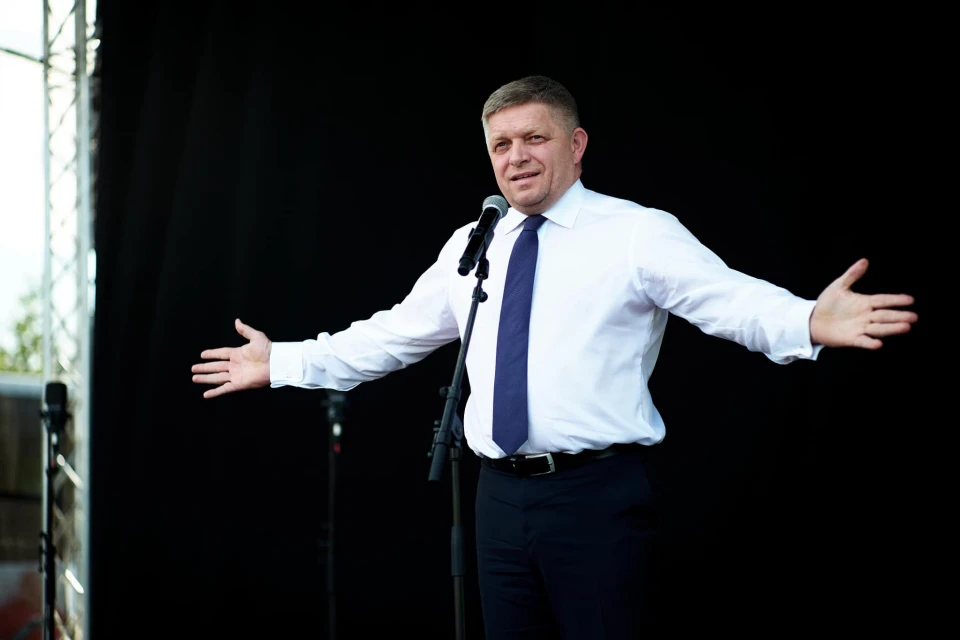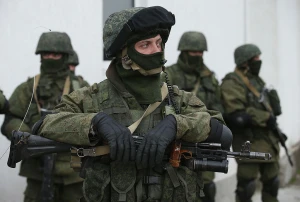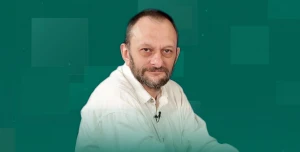
Who is Robert Fico? Will Slovakia turn its course toward Russia and what is Ukraine losing?
Espreso explains whether Kremlin sympathizer, odious populist Robert Fico, whose party won the recent Slovak parliamentary elections, can become prime minister for the fourth time, which coalition in the government is most realistic, and what is bad and what is not for Ukraine in this scenario
What's in the text
- Who is Robert Fico? The fourth time in the Slovak prime minister's chair
- "Not a single bullet for Ukraine". What does Fico want?
- A turn to Russia? What kind of coalition will Slovakia get and what should Ukraine prepare for?
On Sunday, October 1, parliamentary elections were held in Ukraine's neighboring Slovakia. As predicted by sociologists, the pro-Russian Smer-SD party, led by Kremlin supporter Robert Fico, won. The odious populist has been claiming since 2014 that sanctions against Moscow are ineffective and that the war was started by "Ukrainian fascists and Nazis" in Donbas. During this year's campaign, the former prime minister claimed that if he won, Slovakia would stop providing military assistance to Kyiv, and after the election, he scandalously stated that he favored peace talks in Russia's war against Ukraine. As early as Monday, October 2, President Zuzana Čaputová instructed Fico, whose party won, to form a government. We explain below what the ardent Putin sympathizer wants, whether he will become prime minister, what coalition is likely to be formed in the Slovak government, and, last but not least, what Ukraine should expect if Fico becomes prime minister again.
Who is Robert Fico? Fourth time in the Slovak prime minister's chair
Robert Fico was born on September 15, 1964, into a working-class family in Topolcany, in what was then Czechoslovakia, now western Slovakia. A lawyer by profession, he began his political career in the Communist Party shortly before the Velvet Revolution in 1989, which led to the dissolution of Czechoslovakia.
He served as Slovakia's representative to the European Court of Human Rights (ECHR) from 1994 to 2000 and founded his center-left Smer-SD party in 1999 after being denied a ministerial post by the Democratic Left Party (SDL), the successor to the Communists.
Two years after Slovakia joined the EU, in 2006, Smer won a landslide victory, allowing Fico to take the prime minister's chair. In 2009, he led his country into the eurozone (a monetary union of 20 EU member states that have adopted the euro as their national currency - author). In 2012, Fico was unable to form a coalition despite winning the election, so he spent the next two years in opposition.
Already in 2012, his Smer party won another landslide victory in early elections after the collapse of the center-right coalition due to corruption allegations, which allowed Fico to form a "one-color" government. In 2016, he won the election for the third time, but two years later, his premiership ended in the "Slovak Maidan" - Fico was forced to resign amid mass protests over the murder of investigative journalist and anti-corruption activist Ján Kuciak and his fiancee Martina Kušnírová.
He also ran unsuccessfully in the 2014 presidential election, where he was defeated in the second round by independent candidate Andrej Kiska.
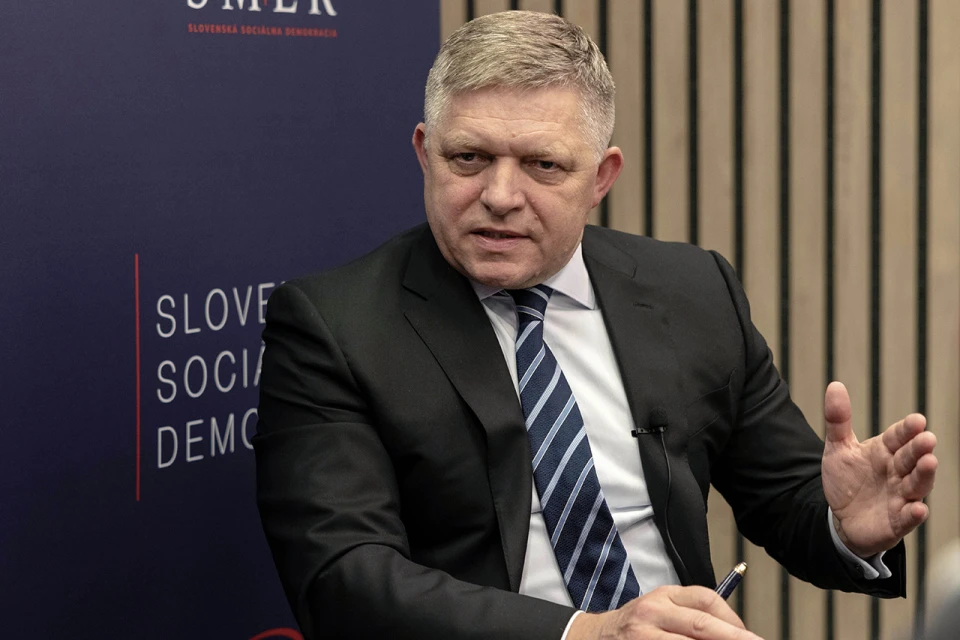
Photo: Getty Images
Fico is an odious and populist politician who has been plagued by corruption allegations that he has always denied. Due to sharp criticism related to the party's uncompromising funding of Slovakia's EU presidency, Fico called some journalists "dirty anti-Slovak wh*res." And he dubbed President Zuzana Čaputová a "US puppet." In April 2022, he was accused of creating a criminal organization together with lawyer and politician Robert Kaliniak.
Fico admires Vladimir Putin and has stated that he would not allow the Russian president to be arrested on an international warrant if he came to Slovakia. He also sympathizes with Hungarian Prime Minister Viktor Orban, who, in his words, "defends the interests of his country and his people."
"Not a single bullet for Ukraine". What does Fico want?
The leader of the Smer-SD party is known for his pro-Russian stance. Since 2014, he has called the EU sanctions against Russia ineffective and saw them as a threat to the Slovak economy. Fico cynically stated that the war in Ukraine began because "Ukrainian Nazis and fascists started killing Russians in Donbas."
"I believe that the war in Ukraine did not begin a year and two months ago, but began in 2014 when Ukrainian fascists were killing people of Russian nationality in Ukraine. [...] I still believe that the Americans are at war with Russia because of Ukrainian soldiers," Fico said.
After the start of Russia's full-scale invasion, he again criticized European sanctions against Russia and the Heger government's assistance to Ukraine. The head of the Smer-SD has repeatedly stated that if his party wins, Slovakia will stop supplying Ukraine with military aid. He assured that he would not send "another bullet" to help Ukraine fight Russian aggression.
It should also be mentioned that Fico even doubts the facts of the genocide in Bucha, and he published secret data on social media about the transportation of S-300 systems through Slovakia. He also promised to veto Ukraine's accession to NATO.
"It is naive to think that Russia will leave Crimea. It is naive to think that Russia will leave the territory it controls. So explain to me, why kill? Why don't we force the opposing sides, using the authority of the EU and the US, to sit down and find some kind of compromise that would guarantee security for Ukraine. You know my opinion, I am fundamentally against Ukraine's membership in NATO, it would mean World War III," Fico said.
Robert Fico made another scandalous statement about the war in Ukraine after he won the recent elections, when he called for peace talks. According to him, Slovakia has bigger problems than helping Ukraine.
"The events in Ukraine are a great tragedy for all of us. If our party is entrusted with forming a government, we will do everything in our power to organize peace talks as soon as possible," Fico said.
In the end, all these lies broadcast by the Smer-SD leader won him some votes and an election victory. Moreover, as sad as it is, his position is supported by many Slovaks. For example, only 40% of the population believes that Russia is responsible for the war in Ukraine.
Fico is generally known for his anti-Western and anti-European rhetoric. He appeals "only to the interests of Slovakia in his heart," has openly criticized the EU and international NGOs, and insulted his rivals during the campaign, falsely accusing them of a coup plot and claiming that the vote would be rigged. Fico is a pro-immigration activist (a key factor that brought him victory in 2016), denies a separate Muslim community in Slovakia, has criticized same-sex marriage, and has called adoption by such couples a perversion. During the Covid-19 pandemic, he was perhaps the country's most prominent voice against masks, quarantine, and vaccination. In general, Fico used the high level of pro-Russian sentiment in Slovakia to undermine the government's pro-Western course.
A turn to Russia? What kind of coalition will Slovakia get and what should Ukraine prepare for?
According to the results of the October 1 parliamentary elections in Slovakia, the pro-Russian Smer-SD party led by former Prime Minister Robert Fico won the election with 22.9% of Slovaks voting for it. The second place went to the pro-European party Progressive Slovakia of Michal Šimečka with 17.9% of the vote. The third place went to the center-left Hlas party of former Prime Minister Peter Pellegrini, which received 14.7%. Four other parties broke the 5% threshold.
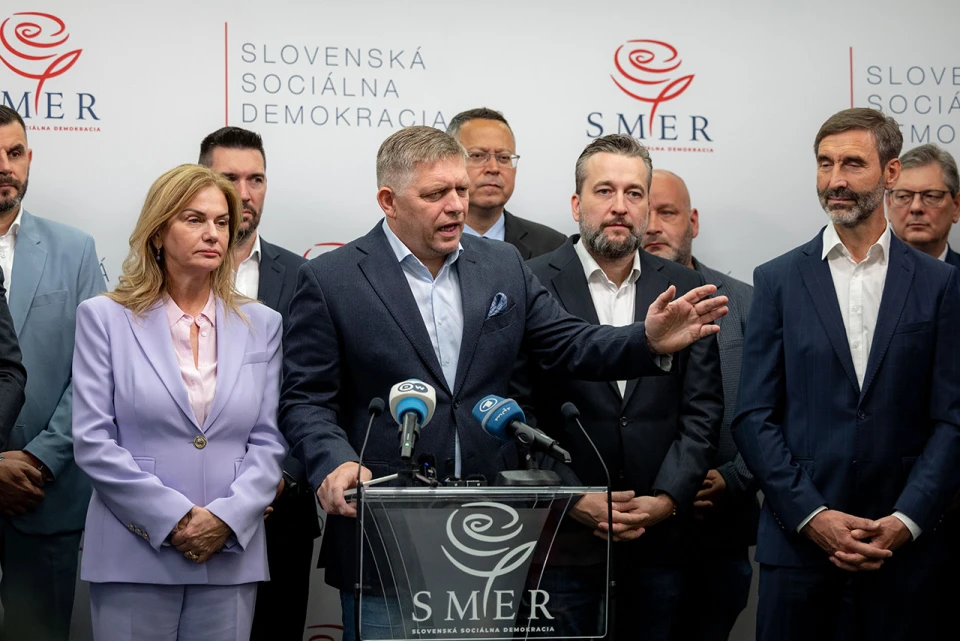
Photo: Getty Images
Since no political party won a majority of votes, the leaders are now looking for partners to form a coalition and form a government.
On Monday, October 2, Slovak President Zuzana Čaputová instructed Robert Fico, whose party won, to form a new government. He is to form a coalition within 15 days, and the government is to start working in a month. However, it is far from certain that Fico will become prime minister.
"Not everyone can join a coalition with Fico, even those he counts on. If he fails to form a coalition, it is very difficult to rule with a minority, and Slovakia is a very unstable country politically. Just look at the fact that it has had 5 prime ministers in the last 5 years. Fico will be constantly on the hook.
Therefore, there is still a chance that Michal Šimečka, the leader of the pro-European, pro-Ukrainian Progressive Slovakia party could become prime minister. But a lot will depend on who comes in third. Peter Pellegrini's Glas party gained about 15%. He, so to speak, has a "golden share", in English, a kingmaker, so his decision whether he will go to Fico or Šimečka probably determines who will become prime minister," Rostyslav Khotyn, a journalist at Radio Liberty who was an observer at the Slovak elections, told Espreso.
According to him, Michal Simečka himself, speaking after the election, actually put Peter Pellegrini in a dilemma, saying that now he was in charge of civilized elections in Slovakia and what kind of country it would be - integrated into the West or turned to Russia. In response, Pellegrini assured him that there was no need to fear that Slovakia would disengage from its NATO and European Union allies, which could be interpreted as a hint at a possible coalition with Šimečka.
There are four possible coalition options, and one of them is pro-Western and pro-Ukrainian, with the participation of Progressive Slovakia.
"One of the advantages is that the extreme pro-Russian fascists from the Republic party did not enter the parliament, which, if they had, could have become part of the coalition. This would have been tragic for both Slovakia and Ukraine. However, it is still too early to talk about the prospects, as there is still an option of a pro-Ukrainian, pro-European coalition without Smer with the participation of Progressive Slovakia, Hlas, and KDH. The choice will be made by the leader of the ODS, Peter Pellegrini, to whom Michal Simečka would have to give the prime minister's chair. This would be a very useful option for Ukraine and would mean a continuation of the current course," Bratislava-based journalist Jakub Loginov told Espreso.
A more realistic option is a coalition of Smer, Hlas, and SNS, which is bad, but not tragic, Loginov notes. Slovakia already had a similar coalition, and Fico was not as pro-Russian in practice as he claimed. In particular, he agreed to reverse gas supplies to Ukraine, and the country's visa policy for Ukrainians was even better than Poland's.
Robert Fico is a pragmatist. So things could be worse with the supply of weapons to Kyiv. After all, Slovakia has already handed over to Ukraine virtually all the Soviet-era weapons it had in storage - tanks, S-300 systems, and most importantly, and Bratislava was the first to do so, MiG-29 fighter jets.
"In both cases, it will be extremely important to focus on accelerating the implementation of cross-border projects, i.e., creating new checkpoints, completing the highway to Uzhhorod, and a new railway from Uzhhorod directly to Košice. It is possible to agree with Fico on this and it may be beneficial for him. This is the only way to change the mood of Slovaks from pro-Russian to pro-Ukrainian," says Loginov.
By building his election campaign on populist anti-European and anti-Ukrainian notes, Fico has again turned Brussels, Washington, Kyiv, and other Western allies and partners against him. So he is in an odious situation both at home and abroad.
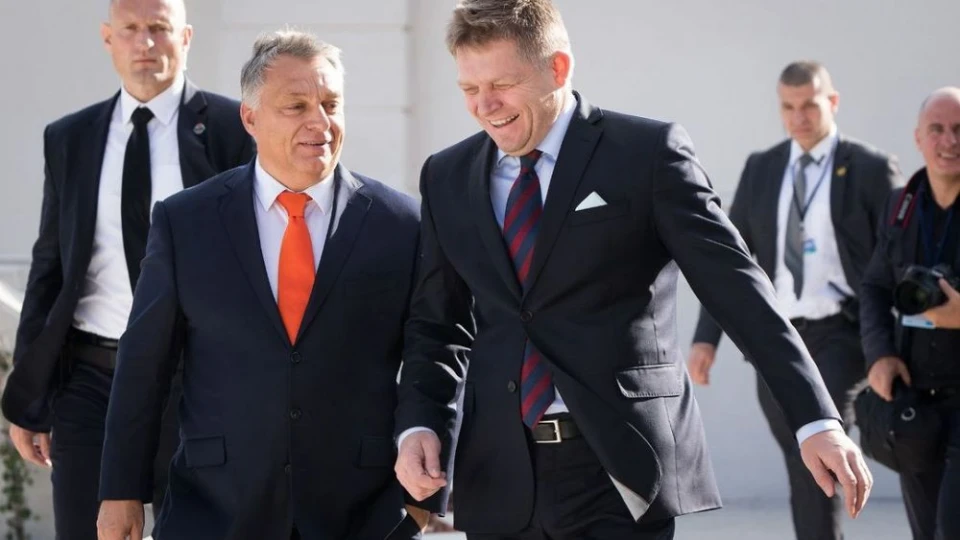
"Overall, this is a serious situation and bad news for both Ukraine and Slovakia. This shows that populism and pro-Russianism can give electoral points in this region. We see the same in Hungary. If Fico becomes prime minister, it will be an authoritarian Slovakia that looks at Russia, ignores it, and considers it necessary not to provide any assistance to Ukraine. Slovakia will be Eurosceptic.
From another perspective, this is bad for the Slovak economy and Slovak companies, because under Fico they will not be allowed to participate in the post-war reconstruction of Ukraine. Slovakia will lose here. If we don't supply weapons, then what? And private companies can't supply weapons? So here, playing the anti-Ukrainian card, Fico is absolutely hitting Slovak interests," explains Rostyslav Khotyn.
In the geopolitical dimension, the victory of pro-Russian forces in Slovakia is complemented by not very positive sentiments toward Ukraine in Poland amid the elections there on October 15. Hungary also remains a Kremlin sympathizer. Liberal democracy and pro-Europeanism are still struggling with the echoes of the socialist totalitarian Soviet system that existed in Central and Eastern Europe. In the end, not everything is so tragic, and it is unlikely that Fico will turn Slovakia into a dictatorship.
"Fico's Slovakia and Kaczyński's Poland are completely different from Orban's Hungary. Fico will not turn Slovakia into a dictatorship. The "only" problem is corruption, the mafia, and economic stagnation, but this will be a problem of the Slovaks themselves. In the geopolitical dimension, Fico will have no problem changing allies and rhetoric, just as he did in 2012-2016 when he switched from anti-Hungarian rhetoric to an alliance with Budapest. The attitudes of ordinary Slovaks toward Hungarians changed in the same way," summarizes Jakub Loginov.
- News






